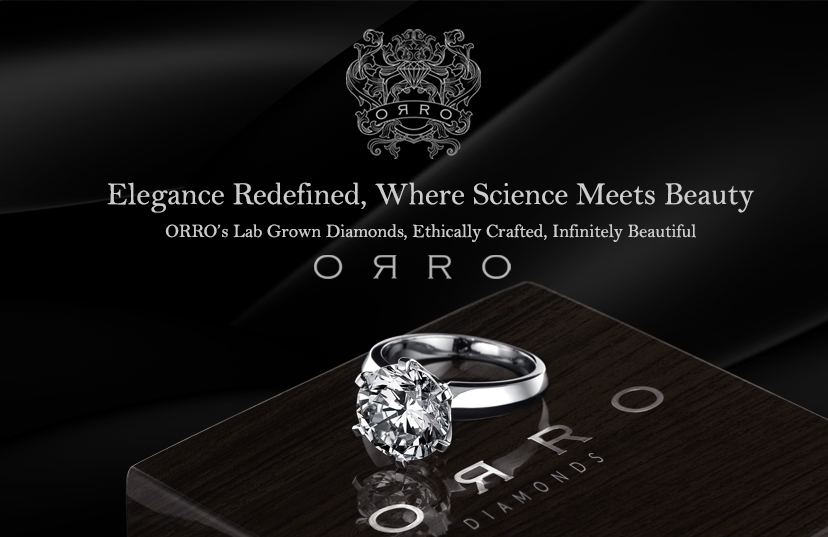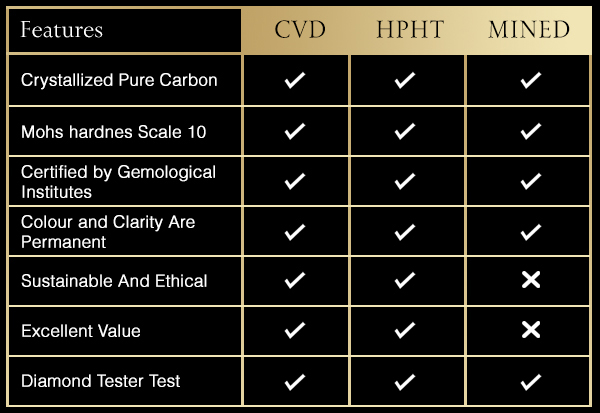Showroom operating hours:
For the month of March 2026,
We are open daily from 11am till 10pm
Click here to find an outlet near you.
Call/WhatsApp us at (+65) 83322940 for assistance
For the month of March 2026,
We are open daily from 11am till 10pm
Click here to find an outlet near you.
Call/WhatsApp us at (+65) 83322940 for assistance

HPHT vs CVD Lab Grown Diamonds
Lab-grown diamonds are a relatively new trend in the diamond industry, and with that, come questions and debates around the various cultivation methods used. The two primary methods used in the lab-grown diamond industry are Chemical Vapor Deposition (CVD) and High Pressure High Temperature (HPHT).
Many people wonder which method is better, but the truth is that there is no difference in the quality of diamonds produced by either method. Both CVD and HPHT diamonds are physically, chemically, and optically identical to naturally mined diamonds. All lab grown diamonds are 100% identical to naturally mined diamonds.
Many people wonder which method is better, but the truth is that there is no difference in the quality of diamonds produced by either method. Both CVD and HPHT diamonds are physically, chemically, and optically identical to naturally mined diamonds. All lab grown diamonds are 100% identical to naturally mined diamonds.

Despite this fact, different companies often promote their preferred method of cultivation. Companies with the backing of a lab grown diamond laboratory that specialize in HPHT diamonds may suggest that their diamonds are superior to CVD diamonds, while companies that works with lab grown diamond factories that use the CVD cultivation methods that produces CVD lab grown diamonds may claim the opposite.
This is simply a marketing ploy to sell more diamonds, as there is absolutely no actual difference in the quality of diamonds produced by either method. Both CVD and HPHT diamonds are created in controlled laboratory settings, replicating the intense pressure and heat that occurs naturally in the Earth's mantle.
At the end of the day, what matters most is the quality of the diamond you are purchasing. When looking for a lab-grown diamond engagement ring or any other piece of jewelry, focus on the diamond's color grade, cut and clarity, rather than the cultivation method.
This is simply a marketing ploy to sell more diamonds, as there is absolutely no actual difference in the quality of diamonds produced by either method. Both CVD and HPHT diamonds are created in controlled laboratory settings, replicating the intense pressure and heat that occurs naturally in the Earth's mantle.
At the end of the day, what matters most is the quality of the diamond you are purchasing. When looking for a lab-grown diamond engagement ring or any other piece of jewelry, focus on the diamond's color grade, cut and clarity, rather than the cultivation method.

At ORRO, we offer ORRO Certified Lab Grown Diamonds and most of our white diamonds are at least a VS quality, ensuring that you receive a high-quality diamond regardless of the cultivation method. ORRO Certified Lab-Grown diamonds are affordable, sustainable, and ethically sourced, making them an excellent choice for eco-conscious and budget-conscious consumers.
In conclusion, when it comes to lab-grown diamonds, it's essential to look beyond the cultivation method and focus on the diamond's quality. Both CVD and HPHT diamonds produce high-quality, ethical, and sustainable diamonds that are indistinguishable from naturally mined diamonds. Choose a ORRO Certified Lab Grown Diamond that fits your budget and preferences, knowing that you're getting a high-quality diamond, regardless of the cultivation method used.
In conclusion, when it comes to lab-grown diamonds, it's essential to look beyond the cultivation method and focus on the diamond's quality. Both CVD and HPHT diamonds produce high-quality, ethical, and sustainable diamonds that are indistinguishable from naturally mined diamonds. Choose a ORRO Certified Lab Grown Diamond that fits your budget and preferences, knowing that you're getting a high-quality diamond, regardless of the cultivation method used.



